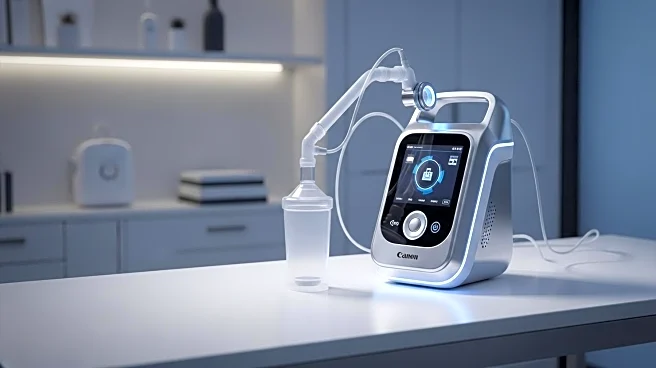What's Happening?
Baxter Canada has launched the Volara oscillation and lung expansion therapy system in the Canadian healthcare market. This system, which was first introduced in the United States in 2020, is now being utilized at the Southern Alberta Adult Cystic Fibrosis Clinic, affiliated with the University of Calgary. The Volara system is designed to offer a more efficient alternative to traditional manual respiratory therapy techniques, aiming to reduce treatment time and patient fatigue. It features a digital touchscreen for customizable treatments and includes an integrated nebulizer for medication delivery. The system is expected to expand its application to other respiratory conditions and patient populations, potentially leading to reduced hospital stays and healthcare costs. This development comes at a time when air quality issues and an aging population are increasing the demand for effective respiratory care solutions in Canada.
Why It's Important?
The introduction of Baxter's Volara system in Canada represents a significant advancement in respiratory care technology. By providing a more efficient and less physically demanding treatment option, the system could improve the quality of life for patients with respiratory conditions, such as cystic fibrosis. Additionally, the potential to reduce hospital stays and healthcare costs could have a positive impact on the Canadian healthcare system, which is facing challenges due to an aging population and environmental factors affecting air quality. The system's ability to deliver medication through an integrated nebulizer also enhances its utility, making it a comprehensive solution for respiratory therapy. This innovation could set a precedent for similar advancements in healthcare technology, emphasizing the importance of integrating digital solutions into patient care.
What's Next?
As the Volara system gains traction in Canada, it is likely to be adopted by more healthcare facilities across the country. This expansion could lead to further studies and data collection on its effectiveness in various patient populations and respiratory conditions. Healthcare providers and policymakers may also explore the system's potential to alleviate pressure on hospital resources by reducing the length of patient stays. Additionally, Baxter may consider further innovations or enhancements to the system based on feedback from its use in Canada, potentially leading to new features or applications. The success of the Volara system in Canada could also influence its adoption in other international markets, contributing to global improvements in respiratory care.
Beyond the Headlines
The deployment of the Volara system in Canada highlights the growing trend of integrating technology into healthcare to improve patient outcomes. This development raises important considerations about the role of digital tools in managing chronic conditions and the potential for such technologies to transform traditional healthcare practices. Ethical considerations may arise regarding access to these advanced systems, particularly in regions with limited healthcare resources. Additionally, the system's success could prompt discussions about the need for ongoing training and support for healthcare professionals to effectively utilize new technologies. As the healthcare industry continues to evolve, the balance between technological innovation and equitable access to care will remain a critical issue.










